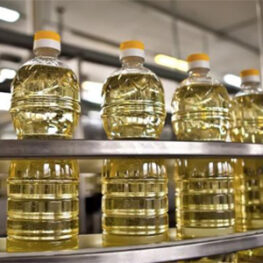Experiments at Harper Adams University have shown sunflower oil could replace costly treatments to battle water loss in plants – with potential implications for drought-hit countries worldwide.
Results from the experiments, conducted in the Harper Adams glasshouse, have been published online in the Journal of the Science of Food and Agriculture.
They assessed the use of sunflower oil as an antitranspirant treatment on oilseed rape plants, comparing it to a commercially available product and to water alone.
Professor of Crop Physiology Peter Kettlewell, who was the supervisor for the project, explained: “Film antitranspirants are liquids which repel water, so that when they are sprayed onto a crop, they dry to form a thin water-repellent film and stop the water vapour escaping from the microscopic pores in the leaf.
“These pores are there to let carbon dioxide – or CO 2 – enter the leaf for the plant to make its food by photosynthesis, but they unfortunately also let water vapour escape – so if a plant doesn’t get any water
from the soil, it will gradually lose its water to the air.
“Plants have a mechanism to close these pores, but this does not happen until the plant has lost a lot of
water.
“Using an antitranspirant to block the pores before the plant loses too much water helps the plant to
survive the lack of water.
“If they are sprayed at the most drought-sensitive stage of a crop, then the benefit of reducing water loss
is greater than the growth limitation from reduced photosynthesis, and yield is greater than of unsprayed
plants.”
For the experiment, a Visiting Researcher from the University of Sao Paolo in Brazil, Rudy Gomes Pereira de Godoi, worked to apply treatments to 50 pots of oilseed rape plants. The treatments included a commercial antitranspirant, different concentrations of sunflower oil, and water alone.
The plants were grown under drought conditions in the glasshouse, with beads added to the top of the
pots to reduce evaporation from the compost. A second experiment was then run to evaluate the effect of
the emulsifier used in each of the treatments.
Both sets of experiments showed that sunflower oil had a positive effect, reducing the loss of water in the
plants by around 20 per cent.
While Professor Kettlewell says field trials will be needed to confirm both if the project can be replicated
on larger scale and to discover the effects of other oils. However, he believes that, if replicated, the
discovery could have a significant impact in drought-hit countries – particularly for poorer farmers.
He added: “Because plant oils are much cheaper and readily available in lower-income countries, then
poorer farmers are more likely to be able to afford to try using an oil as an antitranspirant to help their
crops to produce more yield under drought conditions.
“One of the most common film antitranspirants costs about US$20 – or about £15 – to spray one hectare
– an area just over a couple of football pitches. In sub-Saharan Africa, the vast majority of farms are less
than one hectare.
“This cost means that the main uses for antitranspirants at present are on high value ornamental plants
rather than field crops, but a plant oil like sunflower oil will cost less than US$2 – about £1.50 – to spray
the same area – and be available almost anywhere.”
Professsor Kettlewell also believes the use of sunflower oil, proved effective, could benefit the
environment in two further ways.
He said: “Some film antitranspirants are produced from petroleum oil, and break down in the
environment slowly whereas a plant oil will break down much faster.
“And, of course, there is no net contribution to global warming from plant products!”
